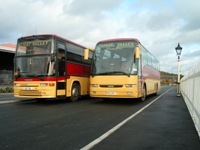
Energetic regional manager continues to lobby for the coach industry
Phil Bateman, CPT West Midlands (WM) regional manager is continuing in his efforts to improve facilities for the coaching industry, as he conducts a coach parking survey of his region.
The survey quizzes local authorities on such matters as the number of coach parking spaces in a given town/city centre, whether there are any proposals to construct spaces this year or later, and whether these local authorities have a designated coach park.
“The coach is a unique form of transport, being greener than a train, a car, or an aeroplane. It is just the sort of transport which towns and cities should encourage as we all face up to austerity effects in our local economy,” he said.
The 2008 UK Tourism Survey noted that £1.2 billion is spent annually as a result of a coach journey, equating to £189 per coach traveller, highlighting the significance of the coach as a travel medium and the lucrative nature of this business.
It is Bateman’s hope that this information can “be used to inform colleagues of coach parking and in any forward campaigns to improve the industry for communities and customers.”
“I am currently conducting a survey of the WM region, and am requesting information about coach parking in our largest towns and cities,” explained Bateman. “Coaches are a valuable resource to the local economy; I am keen that CPT members contribute strongly to the region’s economic performance. However, in order to do this, the coach requires Local Government to create and deliver some infrastructure to enable the coach to deliver its full potential.
“I have asked Local Authorities to spend a few minutes answering just four questions. The coach is a unique form of transport, being greener than a train, a car, or an airplane. It is just the sort of transport that towns and cities should encourage as we all face up to austerity effects in our local economy.
It is estimated that £1.2 billion is spent every year as a result of a coach journey, which is approximately £189 per coach traveller (Source: UK Tourism Survey, 2008).”
The survey asks every local authority in the WM region to identify:
- The number of coach parking spaces which exist in their town/city centre today;
- Any proposals to construct spaces in 2011 onwards;
- Does the local authority have a designated Coach Park; &
- Does the local authority know how many coach visits are made to your town/city in the 2010, if so what are the statistics.
“I hope we will be able to capture this information, which will then be used to inform colleagues of coach parking and in any forward campaigns to improve the industry for communities and customers. I am pleased to say that I am already receiving information from local authorities, with Solihull and Herefordshire County Council being amongst the first to respond,” Bateman concluded.
Visit the CPT website at www.cpt-uk.org or E-mail Phil Bateman on [email protected]


